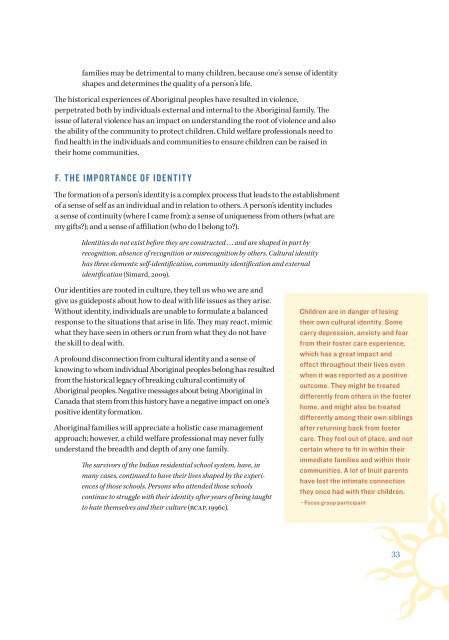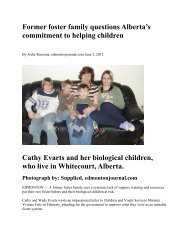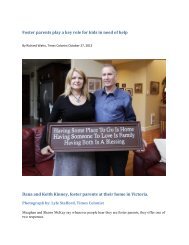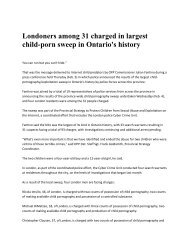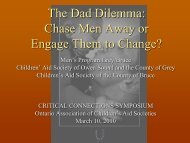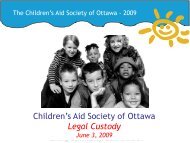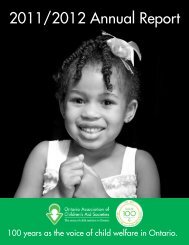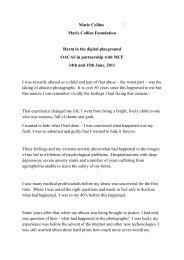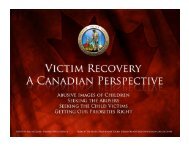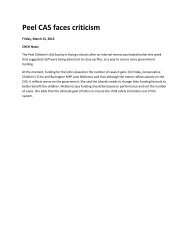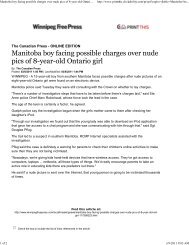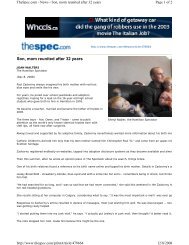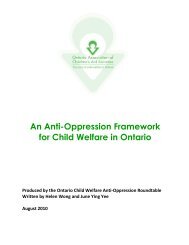English - Ontario Association of Children's Aid Societies
English - Ontario Association of Children's Aid Societies
English - Ontario Association of Children's Aid Societies
Create successful ePaper yourself
Turn your PDF publications into a flip-book with our unique Google optimized e-Paper software.
families may be detrimental to many children, because one’s sense <strong>of</strong> identity<br />
shapes and determines the quality <strong>of</strong> a person’s life.<br />
The historical experiences <strong>of</strong> Aboriginal peoples have resulted in violence,<br />
perpetrated both by individuals external and internal to the Aboriginal family. The<br />
issue <strong>of</strong> lateral violence has an impact on understanding the root <strong>of</strong> violence and also<br />
the ability <strong>of</strong> the community to protect children. Child welfare pr<strong>of</strong>essionals need to<br />
find health in the individuals and communities to ensure children can be raised in<br />
their home communities.<br />
F. THE IMPORTANCE OF IDENTITY<br />
The formation <strong>of</strong> a person’s identity is a complex process that leads to the establishment<br />
<strong>of</strong> a sense <strong>of</strong> self as an individual and in relation to others. A person’s identity includes<br />
a sense <strong>of</strong> continuity (where I came from); a sense <strong>of</strong> uniqueness from others (what are<br />
my gifts); and a sense <strong>of</strong> affiliation (who do I belong to).<br />
Identities do not exist before they are constructed . . . and are shaped in part by<br />
recognition, absence <strong>of</strong> recognition or misrecognition by others. Cultural identity<br />
has three elements: self-identification, community identification and external<br />
identification (Simard, 2009).<br />
Our identities are rooted in culture, they tell us who we are and<br />
give us guideposts about how to deal with life issues as they arise.<br />
Without identity, individuals are unable to formulate a balanced<br />
response to the situations that arise in life. They may react, mimic<br />
what they have seen in others or run from what they do not have<br />
the skill to deal with.<br />
A pr<strong>of</strong>ound disconnection from cultural identity and a sense <strong>of</strong><br />
knowing to whom individual Aboriginal peoples belong has resulted<br />
from the historical legacy <strong>of</strong> breaking cultural continuity <strong>of</strong><br />
Aboriginal peoples. Negative messages about being Aboriginal in<br />
Canada that stem from this history have a negative impact on one’s<br />
positive identity formation.<br />
Aboriginal families will appreciate a holistic case management<br />
approach; however, a child welfare pr<strong>of</strong>essional may never fully<br />
understand the breadth and depth <strong>of</strong> any one family.<br />
The survivors <strong>of</strong> the Indian residential school system, have, in<br />
many cases, continued to have their lives shaped by the experiences<br />
<strong>of</strong> those schools. Persons who attended those schools<br />
continue to struggle with their identity after years <strong>of</strong> being taught<br />
to hate themselves and their culture (RCAP, 1996c).<br />
Children are in danger <strong>of</strong> losing<br />
their own cultural identity. Some<br />
carry depression, anxiety and fear<br />
from their foster care experience,<br />
which has a great impact and<br />
effect throughout their lives even<br />
when it was reported as a positive<br />
outcome. They might be treated<br />
differently from others in the foster<br />
home, and might also be treated<br />
differently among their own siblings<br />
after returning back from foster<br />
care. They feel out <strong>of</strong> place, and not<br />
certain where to fit in within their<br />
immediate families and within their<br />
communities. A lot <strong>of</strong> Inuit parents<br />
have lost the intimate connection<br />
they once had with their children.<br />
- Focus group participant<br />
33


